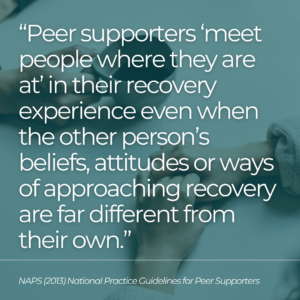Peer Support is an extremely effective and evidence-based mental health service that uses a person’s lived experience to help others in their recovery. This blog is part of a series that will take a deeper look at what it means to work as a Peer Support Professional and how to adhere to the ethical guidelines created by the National Association of Peer Supporters (NAPS).
For this blog, we will be focusing on the guideline that states Peer Support Professionals are open-minded.
 Why is this guideline important?
Why is this guideline important?
As stated by the National Association of Peer Supporters in their ethical guidelines, Peer Support Professionals should always aim to “meet people where they are at.” This idea and practice has grown in popularity, and with good reason, as we strive to understand that human beings are diverse in nature. But what exactly does it mean to “meet someone where they are” and why is it important for Peer Support Professionals?
In a blog hosted on Wild Simple Joy, Dawn Perez writes:
“Meeting someone where they are means bridging the gap between your own expectations and where the other person is coming from. It means intentionally listening to understand their values, needs, desires, and even their trauma-responses. To ‘meet them where they are’ is a skill everyone should learn.”
We are all experts on our own lives, and of course we hold a special place in our minds for the people and plans that have helped us on our own recovery journey. It can be a natural response to offer up advice or perspectives from our own experiences when we support others through their challenges. However, offering up our own advice or opinions on wellness strategies can feel judgmental or invalidating for folks when it is not asked for.
The role of a Peer Support Professional is not about giving advice, evaluating, or assessing the people they work with. Instead, the focus is on accepting the person and supporting them in finding their own path forward.
What does this guideline look like in practice?
One of the best ways to use this guideline of open-mindedness as a Peer Support Professional is to first begin with reflecting on your own values. Understanding what is important to you and your wellness can help you separate what may be important for others.
For example, if you have a close relationship with some of your family members, you may be more inclined to rely on them to help support you through your recovery. However, the person you are working with may feel more comfortable seeking out support through a friend or trusted co-worker. You can acknowledge that while your support system is incredibly important to you, there is also equal value and importance in the other person’s support system as well. The same can be said for other supports and resources as well. Programs, spiritual beliefs, wellness tools, and even definitions of “recovery” can look entirely different from person to person. Peer Support Professionals should work to encourage those they work with to engage in their values and use that which works best for them.
Understandably, the application of this guideline may not always be as straightforward as described above. For instance, a Peer Support Professional may be working in a setting that adheres to rules surrounding religious beliefs, medication, or sobriety. It can feel challenging to encourage folks to choose their own paths when the organization you work for requires them to follow different rules in order to receive care. In these situations, it can be helpful for the Peer Support Professional to remain transparent with individuals they are working with and clarify the rules of their organization through an open-minded perspective. Using a phrase like:
“I can see why that is important to you. While I won’t be able to help you with that here, maybe I can help you find other ways to pursue that.”
Simply acknowledging or validating a person’s beliefs can be a great way to engage in open-mindedness. Additionally, if it’s possible, engaging in “warm hand offs” can be another way to navigate supporting folks in their recovery. Walking them to another department, or personally introducing them to another person or resource can be another source of validation. This can also be a helpful tool in maintaining your own boundaries should you ever feel challenged in accepting someone else’s values or path.
How to use this guideline moving forward.
Open-mindedness is something that we should all strive for as we continue to live our lives with others. Peer Support Professionals can serve as a source of acceptance and unconditional positive regard for others as they work towards their own sense of resilience and wellness.
